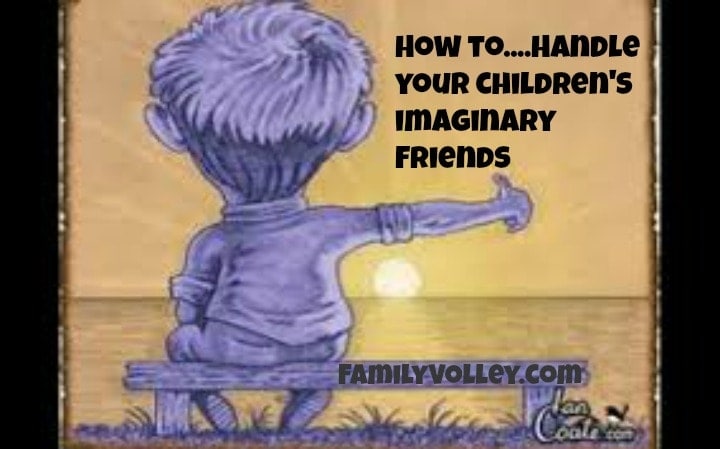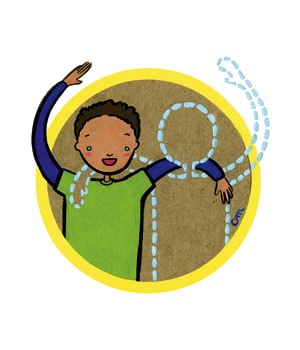Hello OSSS readers! It’s Heather here again.
Yesterday our 3 1/2 year old daughter asked if she could bring her friends Emily and Ashley with us on a family walk. Now, we let friends join us on walks, but this situation was tricky. Why? Because Emily and Ashley are not real, they are her imaginary friends.
They made an appearance last August when our other children went back to school (to replace the siblings she lost to school). They are not always around, just sometimes. Before you wonder if her request freaked us out, it didn’t, we have dealt with imaginary friends before with our other three children. We know they are a phase. They are very common and usually show up around 2 or 3. By 5 or 6 they have usually disappeared. And, although our kids usually wont admit it, most kids know that their friends are not real.
As parents, we don’t need to be afraid. Nothing is wrong with our children, and it doesn’t mean that they won’t ever have real friends. In fact, kids who have imaginary friends have plenty of real friends. They are creative, independent, cooperative with their playmates and teachers and sociable. They grow up knowing the difference between real and pretend just like other kids.
So why do they have imaginary friends?
Think for a minute about what it must be like to be a toddler. Everyone always telling you what to do, and older siblings and friends who want your toys and compete with you for attention of parents and friends. Who wouldn’t want a friend who never takes your toys, does what you say and never steals your attention. They are the ideal friend. Heck, I want an imaginary friend. 🙂 They can also protect when our kids get scared, be a scapegoat when our kids need someone to blame something on, and an outlet when they need to express emotion.
Here are some tips for how to handle your children’s imaginary friends:
Accept imaginary friends. There is no need to constantly point out to our children that their friends are not real. That will not get them to go away. Be kind and welcoming and go along with your children’s requests. It is okay to pretend to pour an extra drink. Pretend is the key. No need to really pour an extra class, just like if the two of you were playing tea party or dolls.
Don’t squash their imagination. Our kids need to imagine. They will need that imagination for the rest of their lives. Don’t ever make fun of their imaginary friends, or make them feel dumb for having them. The wrong response from parents can make children sink further into the pretend world. And can make them feel silly and stop imagining all together.
Don’t initiate, DO communicate. As parents we don’t need to ask if the imaginary friend is going to go with you to get ice cream. Always wait until your child initiates and then you can play along. At the same time, give your kids lots of opportunities to express how they feel. When they don’t know how to act or how to tell others how they feel, they use their imaginary friend to express those feelings. Always be sure the lines of communication are open.
Don’t let your child use her imaginary friend as a scapegoat. Do not let your child blame their imaginary friend for things they do wrong or are trying to get away with. Children still need to be accountable for their actions and it is our job as parents to enforce the consequences. When your child blames their mess on a pretend friend, tell your child that because they are friends they can help pick the mess up. If they refuse, the imaginary game is over and you insist that they take care of the mess they made.
Don’t use the friend to get YOUR way. Saying things like “Well Emily wants you to eat your carrots,” is not a good approach. Some children will play along, but others might feel you are taking over.
Give your kids lots of opportunities to use their imagination and play WITH them. Encourage your kids to play pretend, play dolls, be a superhero, read books, play dress up. And do it with them. Kids can make up friends because they are not getting enough attention from their parents. Never let the imaginary friend be a substitute for real parental attention and real friends. Spend more time with your child.
Gain insight. Imaginary friends can give us SO much insight into how our child really feels. If the imaginary friend is afraid of the dark, it could mean your child is afraid of the dark. Listen to that friend and learn from them.
Having an imaginary friend is normal. Unless your child is becoming withdraw and refusing to interact with others, don’t worry the friend will eventually find another house to hang out at. Until that time, be kind and open to the new friend.
DO YOUR CHILDREN HAVE IMAGINARY FRIENDS? HOW DO YOU HANDLE IT?
Top Image via google images and imaginary-friends.onemusic.tv. Bottom image via google images and canadianfamily.ca
For more parenting advice, check out these posts on OSSS:
Tips for Parenting a Shy Child


I love that you posted about this!
My daughter started with her imaginary friends (FOUR OF THEM plus a dog) a couple of years ago. It got intense. She would take the time to buckle them into imaginary car seats, to brush their teeth, to hold an imaginary leash everywhere we wen..t. She would even hold full-on conversations with them.
Three of them are named after real friends who are sisters, and I think it was her way of having her own sisters when she knew her brother was going to be born. She has a real dog, though, so I’m not sure why she needed an imaginary one, too.
I’ve indulged these imaginary friends and they seem to make less frequent appearances these days. But man, it was tough keeping up with all of them for so long!